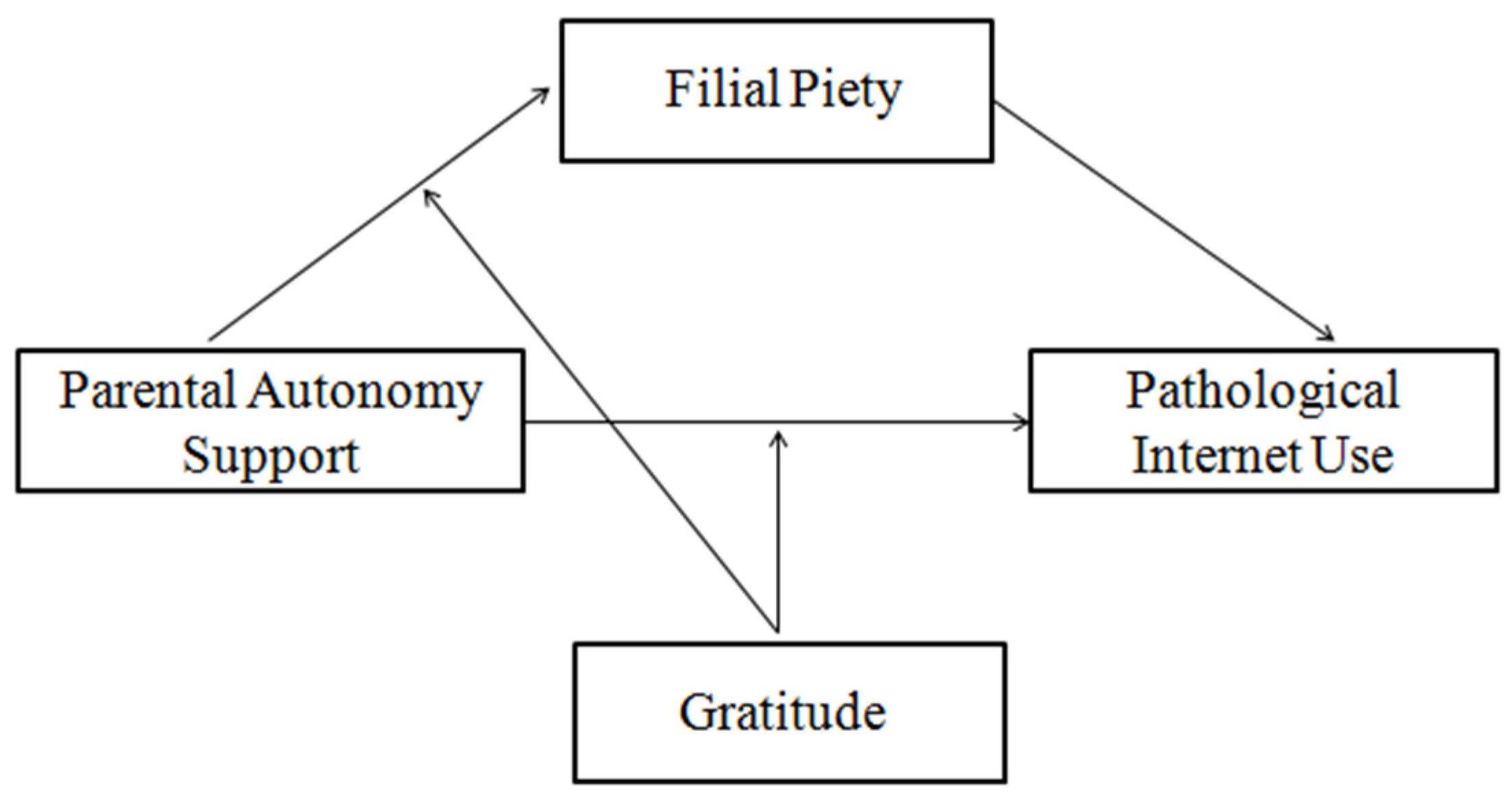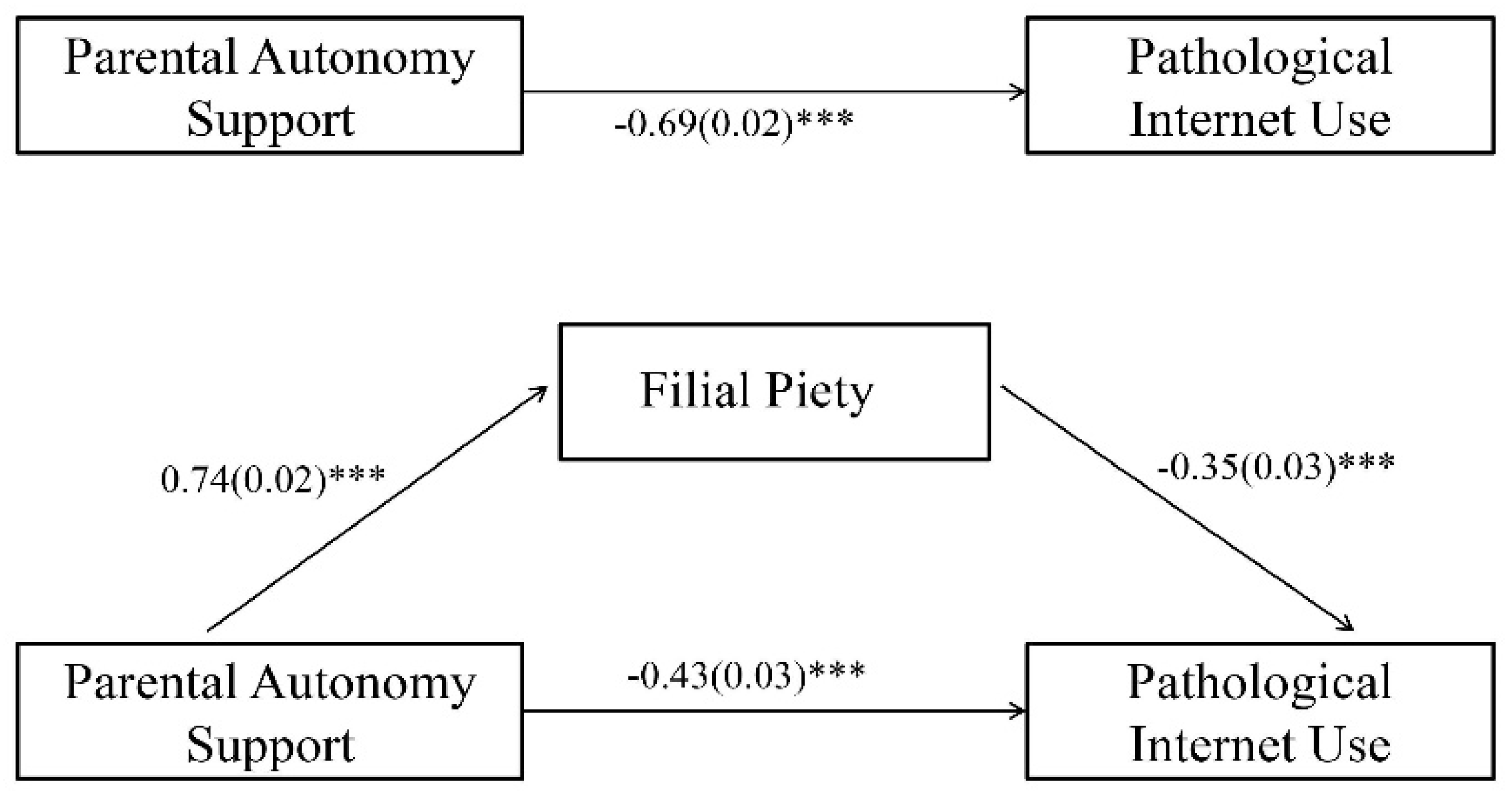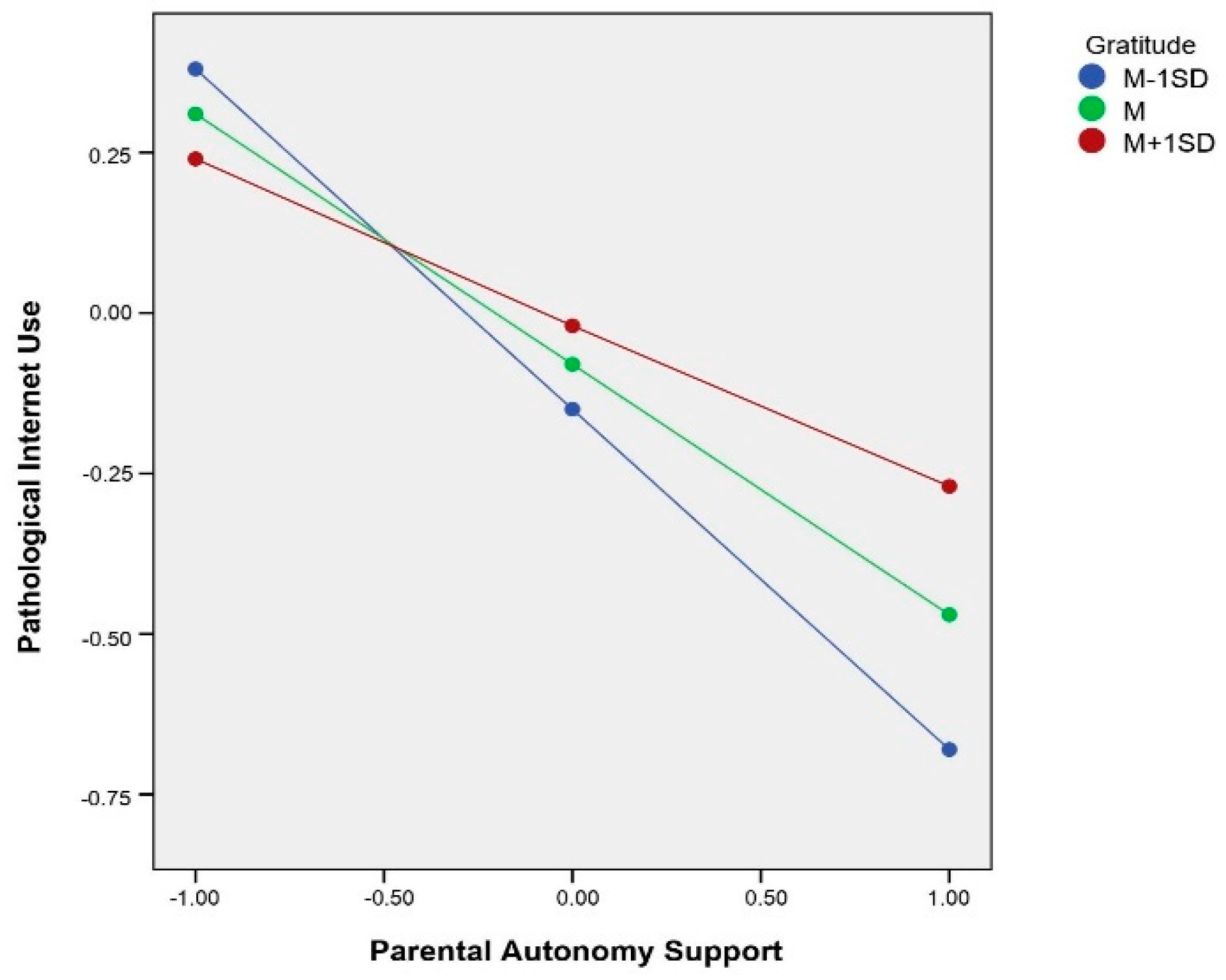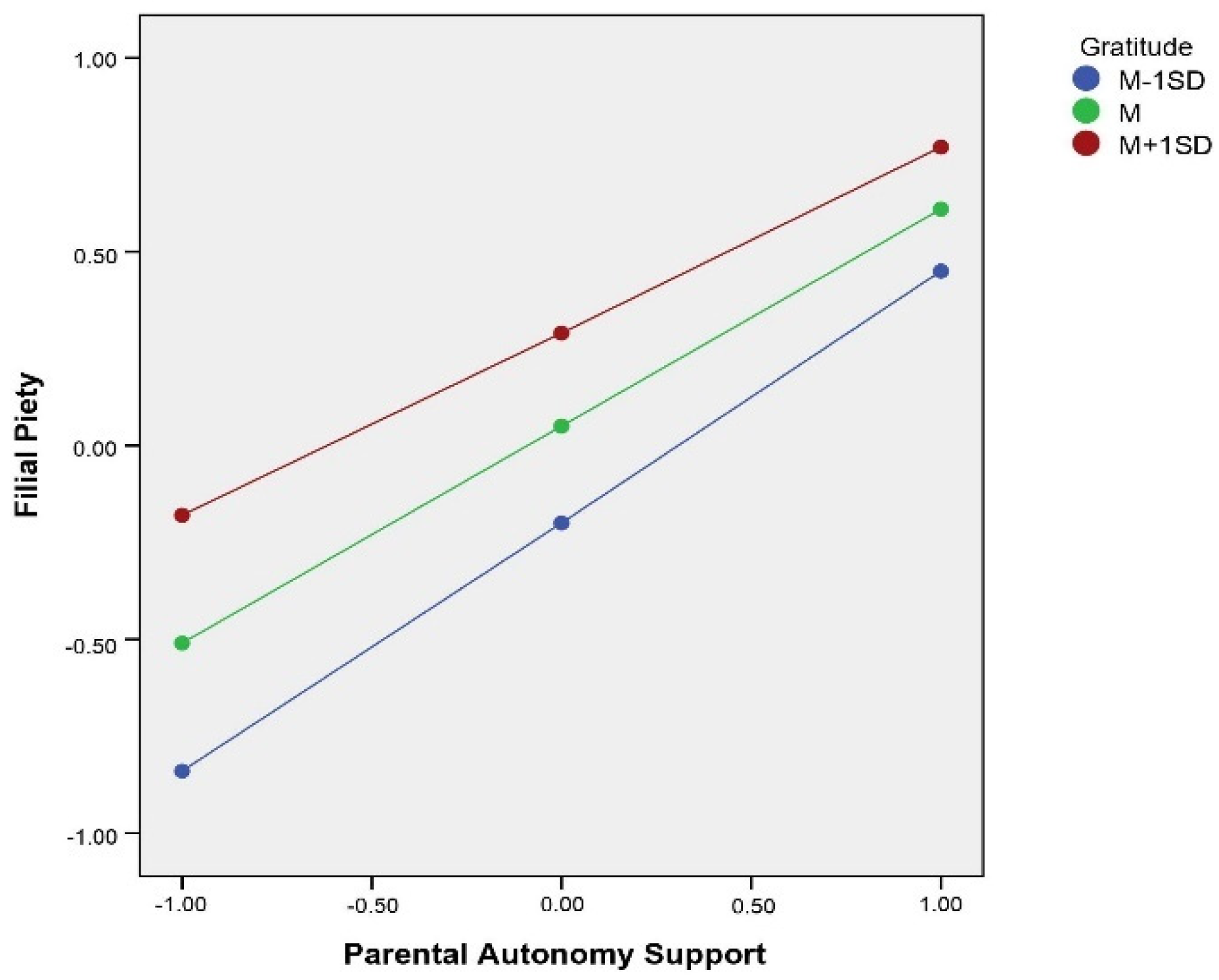Parental Autonomy Support and Pathological Internet Use among Chinese Undergraduate Students: Gratitude Moderated the Mediating Effect of Filial Piety
Abstract
:1. Introduction
1.1. Parental Autonomy Support and Pathological Internet Use
1.2. Filial Piety as a Mediator
1.3. Gratitude as a Moderator
1.4. The Present Study
2. Methods
2.1. Participants and Procedures
2.2. Measures
2.2.1. Parental Autonomy Support
2.2.2. Filial Piety
2.2.3. Gratitude
2.2.4. Pathological Internet Use
2.2.5. Data Analysis Plan
3. Results
3.1. Preliminary Analyses
3.2. Test for Mediation
3.3. Test for Moderated Mediation
4. Discussion
5. Limitations
6. Conclusions
Author Contributions
Funding
Institutional Review Board Statement
Informed Consent Statement
Data Availability Statement
Conflicts of Interest
References
- China Internet Network Information Center [CNNIC]. The 48th China Statistical Report on Internet Development. 2021. Available online: http://www.cnnic.net.cn/hlwfzyj/hlwxzbg/hlwtjbg/202109/t20210915_71543.htm (accessed on 10 September 2021).
- Davis, R.A. A cognitive-behavioral model of pathological Internet use. Comput. Hum. Behav. 2001, 17, 187–195. [Google Scholar] [CrossRef]
- Morahan-Martin, J.; Schumacher, P. Incidence and correlates of pathological Internet use among college students. Comput. Hum. Behav. 2000, 16, 13–29. [Google Scholar] [CrossRef]
- Lau, W.W. Effects of social media usage and social media multitasking on the academic performance of university students. Comput. Hum. Behav. 2017, 68, 286–291. [Google Scholar] [CrossRef]
- Liu, D.; Wang, Z.; Yang, X.; Zhang, Y.; Zhang, R.; Lin, S. Perceived autonomy-supportive parenting and internet addiction: Respiratory sinus arrhythmia moderated the mediating effect of basic psychological need satisfaction. Curr. Psychol. 2019, 6, 4255–4264. [Google Scholar] [CrossRef]
- Arnett, J.J. Emerging Adulthood: The Winding Road from the Late Teens Through the Twenties; Oxford University Press: Oxford, UK, 2014. [Google Scholar]
- Coyne, S.M.; Padilla-Walker, L.M.; Howard, E. Emerging in a digital world: A decade review of media use, effects, and gratifications in emerging adulthood. Emerg. Adulthood 2013, 1, 125–137. [Google Scholar] [CrossRef]
- Tian, Y.; Bian, Y.; Han, P.; Gao, F.; Wang, P. Associations between psychosocial factors and generalized pathological internet use in chinese university students: A longitudinal cross-lagged analysis. Comput. Hum. Behav. 2017, 72, 178–188. [Google Scholar] [CrossRef]
- Yao, M.Z.; Zhong, Z. Loneliness, social contacts and Internet addiction: A cross-lagged panel study. Comput. Hum. Behav. 2014, 30, 164–170. [Google Scholar] [CrossRef]
- Bronfenbrenner, U. The Ecology of Human Development; Harvard University Press: Cambridge, MA, USA, 1979. [Google Scholar]
- Brighi, A.; Menin, D.; Skrzypiec, G.; Guarini, A. Young, bullying, and connected. Common pathways to cyberbullying and problematic internet use in adolescence. Front. Psychol. 2019, 10, 1467. [Google Scholar] [CrossRef]
- Li, D.; Li, X.; Zhao, L.; Zhou, Y.; Sun, W.; Wang, Y. Linking multiple risk exposure profiles with adolescent Internet addiction: Insights from the person-centered approach. Comput. Hum. Behav. 2017, 75, 236–244. [Google Scholar] [CrossRef]
- Liu, Q.; Lin, Y.; Zhou, Z.; Zhang, W. Perceived parent-adolescent communication and pathological internet use among Chinese adolescents: A moderated mediation model. J. Child Fam. Stud. 2019, 28, 1571–1580. [Google Scholar] [CrossRef]
- Zhang, T.; Solmon, M. Integrating self-determination theory with the social ecological model to understand students’ physical activity behaviors. Int. Rev. Sport. Exer. Psychol. 2013, 6, 54–76. [Google Scholar] [CrossRef]
- Ryan, R.M.; Deci, E.L. Self-determination theory and the facilitation of intrinsic motivation, social development, and wellbeing. Am. Psychol. 2000, 55, 68–78. [Google Scholar] [CrossRef] [PubMed]
- Ryan, R.M.; Deci, E.L. Self-Determination Theory: Basic Psychological Needs in Motivation, Development, and Wellness; Guilford Publishing: New York, NY, USA, 2017. [Google Scholar]
- Ryan, R.M.; Deci, E.L. Brick by brick: The origins, development, and future of self-determination theory. Adv. Motiv. Sci. 2019, 6, 111–156. [Google Scholar] [CrossRef]
- Soenens, B.; Vansteenkiste, M. A theoretical upgrade of the concept of parental psychological control: Proposing new insights on the basis of self-determination theory. Dev. Rev. 2010, 30, 74–99. [Google Scholar] [CrossRef]
- Lan, X.; Ma, C.; Radin, R. Parental autonomy support and psychological well-being in Tibetan and Han emerging adults: A serial multiple mediation model. Front. Psychol. 2019, 10, 621. [Google Scholar] [CrossRef] [Green Version]
- Lan, X.; Wang, W. Is early left-behind experience harmful to prosocial behavior of emerging adult? the role of parental autonomy support and mindfulness. Curr. Psychol. 2020. [Google Scholar] [CrossRef]
- Ntoumanis, N.; Ng, J.Y.; Prestwich, A.; Quested, E.; Hancox, J.E.; Thøgersen-Ntoumani, C.; Williams, G.C. A meta-analysis of self-determination theory-informed intervention studies in the health domain: Effects on motivation, health behavior, physical, and psychological health. Health Psychol. Rev. 2021, 15, 214–244. [Google Scholar] [CrossRef] [Green Version]
- Tan, S.A.; Nainee, S.; Tan, C.S. The mediating role of reciprocal filial piety in the relationship between parental autonomy support and life satisfaction among adolescents in Malaysia. Curr. Psychol. 2021, 40, 804–812. [Google Scholar] [CrossRef]
- Gutiérrez, M.; Tomás, J.M. The role of perceived autonomy support in predicting university students’ academic success mediated by academic self-efficacy and school engagement. Educ. Psychol. 2019, 39, 729–748. [Google Scholar] [CrossRef]
- Kins, E.; Beyers, W.; Soenens, B.; Vansteenkiste, M. Patterns of home leaving and subjective well-being in emerging adulthood: The role of motivational processes and parental autonomy support. Dev. Psychol. 2009, 45, 1416–1429. [Google Scholar] [CrossRef]
- Inguglia, C.; Ingoglia, S.; Liga, F.; Coco, A.L.; Cricchio, M. Autonomy and relatedness in adolescence and emerging adulthood: Relationships with parental support and psychological distress. J. Adult Dev. 2015, 22, 1–13. [Google Scholar] [CrossRef]
- Phinney, J.S.; Kim-Jo, T.; Osorio, S.; Vilhjalmsdottir, P. Autonomy and relatedness in adolescent-parent disagreements: Ethnic and developmental factors. J. Adolesc. Res. 2005, 20, 8–39. [Google Scholar] [CrossRef]
- VanWel, F.; Linssen, H.; Abma, R. The parental bond and the well-being of adolescents and young adults. J. Youth Adolesc. 2000, 29, 307–318. [Google Scholar] [CrossRef]
- Yao, M.Z.; He, J.; Ko, D.M.; Pang, K. The influence of personality, parental behaviors, and self-esteem on internet addiction: A study of Chinese college students. Cyberpsychol. Behav. Soc. Netw. 2014, 17, 104–110. [Google Scholar] [CrossRef]
- Zhang, H.; Spinrad, T.L.; Eisenberg, N.; Luo, Y.; Wang, Z. Young adults’ internet addiction: Prediction by the interaction of parental marital conflict and respiratory sinus arrhythmia. Int. J. Psychophysiol. 2017, 120, 148–156. [Google Scholar] [CrossRef]
- Chao, R.K.; Tseng, V. Asian and American parenting. In Handbook of Parenting, 2nd ed.; Bornstein, M., Ed.; Earlbaum: Mahwah, NJ, USA, 2002; pp. 59–94. [Google Scholar]
- Nalipay, M.J.N.; King, R.B.; Cai, Y. Autonomy is equally important across East and West: Testing the cross-cultural universality of self-determination theory. J. Adolesc. 2020, 78, 67–72. [Google Scholar] [CrossRef]
- Ho, D.Y.F. Filial piety and its psychological consequences. In The Handbook of Chinese Psychology; Bond, M.H., Ed.; Oxford University Press: New York, NY, USA, 1996; pp. 155–165. [Google Scholar]
- Yeh, K.H.; Bedford, O. A test of the dual filial piety model. Asian J. Soc. Psychol. 2003, 6, 215–228. [Google Scholar] [CrossRef] [Green Version]
- Bedford, O.; Yeh, K.H. The history and the future of the psychology of filial piety: Chinese norms to contextualized personality construct. Front. Psychol. 2019, 10, 100. [Google Scholar] [CrossRef] [Green Version]
- Bedford, O.; Yeh, K.H. Evolution of the conceptualization of filial piety in the global context: From skin to skeleton. Front. Psychol. 2021, 12, 995. [Google Scholar] [CrossRef]
- Guo, M.; Wang, L.; Day, J.; Chen, Y. The Relations of Parental Autonomy Support, Parental Control, and Filial Piety to Chinese Adolescents’ Academic Autonomous Motivation: A Mediation Model. Front. Psychol. 2021, 12, 724675. [Google Scholar] [CrossRef]
- Chen, W.W.; Wu, C.W.; Yeh, K.H. How parenting and filial piety influence happiness, parent–child relationships and quality of family life in Taiwanese adult children. J. Fam. Stud. 2015, 22, 80–96. [Google Scholar] [CrossRef]
- Ismail, N.; Tan, J.P.; Ibrahim, R. The relationship between parental belief on filial piety and child psychosocial adjustment among Malay families. Pertanika J. Soc. Sci. 2009, 17, 283–292. [Google Scholar]
- Chen, W.W. The relationship between perceived parenting style, filial piety, and life satisfaction in Hong Kong. J. Fam. Psychol. 2014, 28, 308–314. [Google Scholar] [CrossRef] [PubMed]
- Leung, A.N.M.; Wong, S.S.F.; Wong, I.W.Y.; McBride-Chang, C. Filial piety and psychosocial adjustment in Hong Kong Chinese early adolescents. J. Early. Adolesc. 2010, 30, 651–667. [Google Scholar] [CrossRef]
- Yeh, K.H.; Cheng, S.P. Parenting, children’s empathy and compliance, and filial types. In Proceedings of the 113th Annual Convention of the American Psychological Association (APA), Washington, DC, USA, 18–21 August 2005. [Google Scholar]
- Mccullough, M.E.; Emmons, R.A.; Tsang, J.A. The grateful disposition: A conceptual and empirical topography. J. Pers. Soc. Psychol. 2002, 82, 112–127. [Google Scholar] [CrossRef]
- Wood, A.M.; Maltby, J.; Stewart, N.; Linley, P.A.; Joseph, S. A social-cognitive model of trait and state levels of gratitude. Emotion 2008, 8, 281–290. [Google Scholar] [CrossRef] [Green Version]
- Jans-Beken, L.; Jacobs, N.; Janssens, M.; Peeters, S.; Reijnders, J.; Lechner, L.; Lataster, J. Gratitude and health: An updated review. J. Posit. Psychol. 2020, 15, 743–782. [Google Scholar] [CrossRef]
- You, S.; Lee, J.; Lee, Y. Relationships between gratitude, social support, and prosocial and problem behaviors. Curr. Psychol. 2020, 4, 1–8. [Google Scholar] [CrossRef]
- Kleiman, E.M.; Adams, L.M.; Kashdan, T.B.; Riskind, J.H. Grateful individuals are not suicidal: Buffering risks associated with hopelessness and depressive symptoms. Personal. Individ. Differ. 2013, 55, 595–599. [Google Scholar] [CrossRef]
- Lo, H.; Kwok, S.; Yeung, J.; Low, A.; Tam, C. The moderating effects of gratitude on the association between perceived parenting styles and suicidal ideation. J. Child. Fam. Stud. 2017, 26, 1671–1680. [Google Scholar] [CrossRef]
- Wood, A.M.; Joseph, S.; Linley, P.A. Coping style as a psychological resource of grateful people. J. Soc. Clin. Psychol. 2007, 26, 1076–1093. [Google Scholar] [CrossRef] [Green Version]
- Fredrickson, B.L. The role of positive emotions in positive psychology: The broaden-and-build theory of positive emotions. Am. Psychol. 2001, 56, 218–226. [Google Scholar] [CrossRef] [PubMed]
- Mccullough, M.E.; Kilpatrick, S.D.; Emmons, R.A.; Larson, D.B. Is gratitude a moral affect? Psychol. Bull. 2001, 127, 249–266. [Google Scholar] [CrossRef] [Green Version]
- Chou, W.J.; Liu, T.L.; Yang, P.; Yen, C.F.; Hu, H.F. Multi-dimensional correlates of internet addiction symptoms in adolescents with attention-deficit/hyperactivity disorder. Psychiatry Res. 2015, 225, 122–128. [Google Scholar] [CrossRef] [PubMed]
- Liu, Q.X.; Fang, X.Y.; Zhou, Z.K.; Zhang, J.T.; Deng, L.Y. Perceived parent-adolescent relationship, perceived parental online behaviors and pathological internet use among adolescents: Gender-specific differences. PLoS ONE 2013, 8, e75642. [Google Scholar] [CrossRef] [Green Version]
- Wang, Q.; Pomerantz, E.M.; Chen, H. The role of parents’ control in early adolescents’ psychological functioning: A longitudinal investigation in the United States and China. Child Dev. 2007, 78, 1592–1610. [Google Scholar] [CrossRef]
- Wang, C.; Nie, Y.; Ma, C.; Lan, X. More Parental Guan, More Academic Engagement? Examining the Moderating Roles of Adolescents’ Gender and Reciprocal Filial Piety. J. Genet. Psychol. 2022, 183, 78–90. [Google Scholar] [CrossRef]
- Kong, F.; Ding, K.; Zhao, J. The relationships among gratitude, self-esteem, social support and life satisfaction among undergraduate students. J. Happiness Stud. 2015, 16, 477–489. [Google Scholar] [CrossRef]
- Hayes, A.F. Introduction to Mediation, Moderation, and Conditional Process Analysis. A Regressionbased Approach; Guilford Press: New York, NY, USA, 2013. [Google Scholar]
- MacKinnon, D.P. Introduction to Statistical Mediation Analysis; Taylor & Francis Group: New York, NY, USA, 2008. [Google Scholar]
- Tabachnick, B.G.; Fidell, L.S.; Osterlind, S.J. Using Multivariate Statistics; Allyn Bacon: Boston, MA, USA, 2001. [Google Scholar]
- Arnett, J.J. Socialization in emerging adulthood: From the family to the wider world, from socialization to self-socialization. In Handbook of Socialization; Grusec, J., Hastings, P., Eds.; Guilford: New York, NY, USA, 2007; pp. 208–231. [Google Scholar]
- Ryan, R.M.; Deci, E.L. Self-determination theory and the role of basic psychological needs in personality and the organization of behavior. In Handbook of Personality; John, O.P., Robbins, R.W., Pervin, L.A., Eds.; Guilford: New York, NY, USA, 2008; pp. 654–678. [Google Scholar]
- Gao, D.; Liu, J.; Bullock, A.; Chen, X. Children’s interpretation moderates relations of maternal autonomy support with sociability and assertiveness in China. Soc. Dev. 2020, 30, 449–462. [Google Scholar] [CrossRef]
- Chen, X.; Cen, G.; Li, D.; He, Y. Social functioning and adjustment in Chinese children: The imprint of historical time. Child Dev. 2005, 76, 182–195. [Google Scholar] [CrossRef]
- Cheah, C.S.L.; Ozdemir, S.B.; Leung, C.Y.Y. Predicting the filial behaviors of Chinese-Malaysian adolescents from perceived parental involvements, filial emotions and parental warmth and support. J. Adolesc. 2012, 35, 628–637. [Google Scholar] [CrossRef] [PubMed]
- DeSteno, D.; Li, Y.; Dickens, L.; Lerner, J.S. Gratitude: A tool for reducing economic impatience. Psychol. Sci. 2014, 25, 1262–1267. [Google Scholar] [CrossRef] [PubMed]
- Bartlett, M.Y.; DeSteno, D. Gratitude and prosocial behavior helping when it costs you. Psychol. Sci. 2006, 17, 319–325. [Google Scholar] [CrossRef]
- Wood, A.M.; Froh, J.J.; Geraghty, A.W.A. Gratitude and well-being: A review and theoretical integration. Clin. Psychol. Rev. 2010, 30, 890–905. [Google Scholar] [CrossRef]




| Variable | M | SD | Range | Skewness | Kurtosis | 1 | 2 | 3 | 4 | 5 | 6 |
|---|---|---|---|---|---|---|---|---|---|---|---|
| 1. PAS | 3.49 | 0.85 | 1–5 | −0.79 | −0.23 | - | |||||
| 2. FP | 3.45 | 0.85 | 1–5 | −0.45 | −0.37 | 0.75 ** | - | ||||
| 3. Gratitude | 3.62 | 0.99 | 0–6 | −0.19 | −0.61 | 0.59 ** | 0.60 ** | - | |||
| 4. PIU | 2.74 | 0.76 | 1–5 | 0.42 | −0.55 | −0.68 ** | −0.66 ** | 0.26 *** | - | ||
| 5. Age | 20.35 | 1.00 | 16–24 | - | - | 0.02 | 0.01 | 0.03 | 0.05 | - | |
| 6. Gender a | - | - | 1–2 | - | - | −0.10 ** | −0.15 ** | −0.14 ** | 0.04 | 0.01 | - |
| Model 1 | Model 2 | Model 3 | ||||
|---|---|---|---|---|---|---|
| PIU | FP | PIU | ||||
| Predictor | b | t | b | t | b | t |
| Gender a | −0.06 | −1.34 | −0.15 | −3.43 *** | −0.12 | −2.55 * |
| Age | 0.06 | 2.63 ** | −0.01 | −0.30 | 0.06 | 2.68 ** |
| PAS | −0.69 | −30.41 *** | 0.74 | 36.32 *** | −0.43 | −13.24 *** |
| FP | −0.35 | −10.87 *** | ||||
| R2 | 0.47 | 0.57 | 0.52 | |||
| F | 310.75 *** | 457.24 *** | 288.60 *** |
| Outcome | Predictor | R | R2 | F | b | t | LLCI | ULCI |
|---|---|---|---|---|---|---|---|---|
| FP | Age | 0.78 | 0.61 | 329.09 *** | −0.01 | −0.39 | −0.05 | 0.03 |
| Gender a | −0.10 | −2.42 * | −0.18 | −0.02 | ||||
| PAS | 0.56 | 21.63 *** | 0.51 | 0.61 | ||||
| Gratitude | 0.24 | 10.02 *** | 0.19 | 0.29 | ||||
| PAS × Gratitude | −0.08 | −3.90 *** | −0.12 | −0.04 | ||||
| PIU | Age | 0.74 | 0.54 | 206.56 *** | 0.05 | 2.37 * | 0.01 | 0.09 |
| Gender a | −0.12 | −2.69 ** | −0.21 | −0.03 | ||||
| PAS | −0.39 | −11.50 *** | −0.46 | −0.32 | ||||
| FP | −0.35 | −10.38 *** | −0.41 | −0.28 | ||||
| Gratitude | 0.06 | 2.17 * | 0.01 | 0.11 | ||||
| PAS × Gratitude | 0.14 | 6.09 *** | 0.09 | 0.18 |
| Gratitude | Conditional Direct (Indirect) Effect | SE (BootSE) | LLCI (BootLLCI) | ULCI (BootULCI) |
|---|---|---|---|---|
| M-SD | −0.53 | 0.04 | −0.60 | −0.46 |
| (−0.22) | (0.03) | (−0.28) | (−0.17) | |
| M | −0.39 | 0.03 | −0.46 | −0.32 |
| (−0.20) | (0.03) | (−0.25) | (−0.14) | |
| M+SD | −0.25 | 0.05 | −0.34 | −0.16 |
| (−0.17) | (0.03) | (−0.22) | −0.12) |
Publisher’s Note: MDPI stays neutral with regard to jurisdictional claims in published maps and institutional affiliations. |
© 2022 by the authors. Licensee MDPI, Basel, Switzerland. This article is an open access article distributed under the terms and conditions of the Creative Commons Attribution (CC BY) license (https://creativecommons.org/licenses/by/4.0/).
Share and Cite
Ma, C.; Ma, Y.; Lan, X. Parental Autonomy Support and Pathological Internet Use among Chinese Undergraduate Students: Gratitude Moderated the Mediating Effect of Filial Piety. Int. J. Environ. Res. Public Health 2022, 19, 2644. https://doi.org/10.3390/ijerph19052644
Ma C, Ma Y, Lan X. Parental Autonomy Support and Pathological Internet Use among Chinese Undergraduate Students: Gratitude Moderated the Mediating Effect of Filial Piety. International Journal of Environmental Research and Public Health. 2022; 19(5):2644. https://doi.org/10.3390/ijerph19052644
Chicago/Turabian StyleMa, Chunhua, Yongfeng Ma, and Xiaoyu Lan. 2022. "Parental Autonomy Support and Pathological Internet Use among Chinese Undergraduate Students: Gratitude Moderated the Mediating Effect of Filial Piety" International Journal of Environmental Research and Public Health 19, no. 5: 2644. https://doi.org/10.3390/ijerph19052644
APA StyleMa, C., Ma, Y., & Lan, X. (2022). Parental Autonomy Support and Pathological Internet Use among Chinese Undergraduate Students: Gratitude Moderated the Mediating Effect of Filial Piety. International Journal of Environmental Research and Public Health, 19(5), 2644. https://doi.org/10.3390/ijerph19052644






